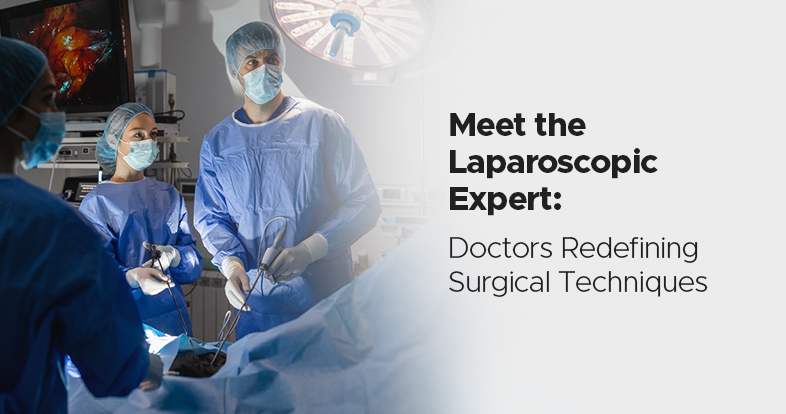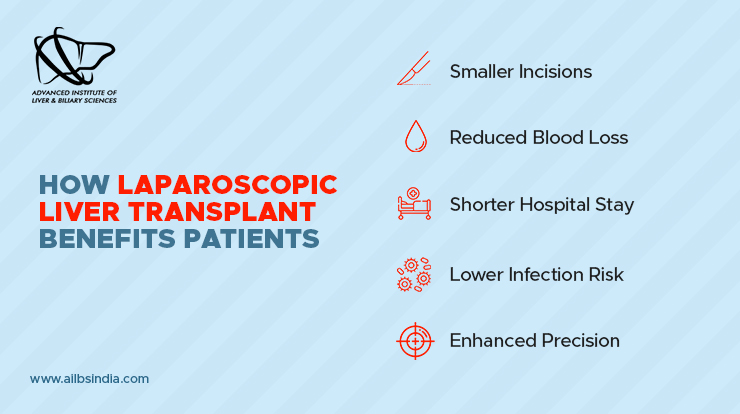
In the world of modern medicine, remarkable advancements are continuously revolutionising the field of surgery. One such frontier person in the field of surgical techniques is Dr. Vivek Vij, a laparoscopic doctor who has been transforming the way surgeries are performed. In this blog, we’ll take a closer look at laparoscopic doctors and explore how laparoscopic liver transplant, a groundbreaking procedure, is changing lives.
The training of laparoscopic surgeons is centred on a minimally invasive surgical procedure known as laparoscopy. In contrast to traditional open surgeries, which need large incisions, laparoscopic procedures use a tiny camera called a laparoscope and small incisions. The following is what laparoscopic doctors do:
Precision and Expertise
Laparoscopic experts are highly skilled surgeons who use their abilities to execute surgeries through extremely small incisions with the utmost precision. The laparoscope’s improved view of the operation area allows them to move precisely.
Minimally Invasive Surgeries
One of the key benefits of laparoscopic doctors is their ability to do less intrusive treatments. Patients gain from smaller wounds, less discomfort, and quicker recovery times compared to traditional open surgery.
Diverse Specialisations
Laparoscopic surgeons can specialise in a variety of fields, such as gastroenterology, gynaecology, urology, and more. Dr. Vivek Vij is highly known for his expertise in liver transplant surgery.
Liver transplantation is a challenging medical treatment that may be a person’s only chance of survival if they have serious liver disease. With the use of laparoscopic techniques, doctors make the procedure safer and more effective. Following are the benefits that patients receive after a laparoscopic liver transplant:

Smaller Incisions
Traditional liver transplant surgery involves making a significant abdominal incision. On the other hand, a laparoscopic liver transplant just needs a few tiny incisions. This greatly lessens post-operative discomfort and scarring, accelerating the healing process.
Reduced Blood Loss
Using laparoscopic procedures, the surgeon can better control bleeding. This results in reduced blood loss, fewer blood transfusions, and a lower chance of problems.
Shorter Hospital Stay
Laparoscopic liver transplant patients frequently had shorter hospital stays. Their general quality of life will improve as they can resume their everyday activities more rapidly.
Lower Infection Risk
With smaller incisions and less exposure of internal organs to the external environment, laparoscopic liver transplant reduces the risk of postoperative infections, which can be a significant concern in open surgeries.
Enhanced Precision
Laparoscopic doctors like Dr. Vivek Vij has access to high-definition cameras and specialised instruments that provide a detailed view of the surgical site. This precision allows for more accurate surgical procedures, leading to improved outcomes for patients.
Dr. Vivek Vij is a leading expert in the field of laparoscopic liver transplant. His commitment to advancing surgical techniques has had a profound impact on the medical community and the lives of his patients. He had done thousands of liver transplant surgeries with high success rates. Here’s a closer look at his contributions:
Dr. Vij’s advanced work in laparoscopic liver transplant has made this life-saving procedure accessible to more patients. His innovative approach has reduced the barriers to transplantation and increased success rates.
With years of experience in laparoscopic surgery, Dr. Vivek Vij has successfully performed numerous liver transplants, earning his patients’ and their families’ trust and gratitude.
Dr. Vij continues to be involved in research and development, striving to refine laparoscopic techniques further and improve patient outcomes. His dedication to innovation drives progress in the field of liver transplantation.
Dr. Vivek Vij and other laparoscopic surgeons are revolutionising surgery by making operations safer, less intrusive, and more readily available to needy patients. Thanks to specialists like Dr. Vij, laparoscopic liver transplant has made outstanding advancements. These advancements give people with severe liver disease hope and a chance at a healthier and happier life. With committed laparoscopic surgeons like Dr. Vivek Vij leading the way, surgery has a bright future.
So, if you or your loved ones are looking for a laparoscopic liver transplant, book an appointment with Dr Vivek Vij.
Contact us today at: +91 9999722221
Q 1: What is laparoscopic liver transplant?
Ans: Laparoscopic liver transplant is a surgical procedure where a damaged or diseased liver is replaced with a healthy liver from a donor. What makes it special is that it’s done through small incisions with the help of a tiny camera and specialised instruments, making it less invasive than traditional open surgery.
Q 2: How is laparoscopic liver transplant different from traditional liver transplant surgery?
Ans: In traditional liver transplant surgery, a large incision is made in the abdomen to access the liver. In laparoscopic liver transplant, only a few small incisions are made, resulting in less pain, reduced scarring, shorter hospital stays, and quicker recovery.
Q 3: Is laparoscopic liver transplant suitable for everyone?
Ans: Not necessarily. A laparoscopic liver transplant is typically suitable for patients who meet specific criteria and have certain liver conditions. It’s essential to consult with a skilled surgeon like Dr. Vivek Vij to determine if this minimally invasive approach is suitable for your specific case.
Q 4: What are the benefits of laparoscopic liver transplant for patients?
Ans: The benefits include smaller incisions, reduced blood loss, shorter hospital stays, a lower risk of infection, and enhanced precision during surgery. Patients often experience less pain and can return to normal activities sooner than traditional open surgery.


